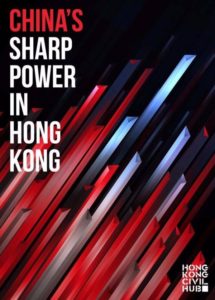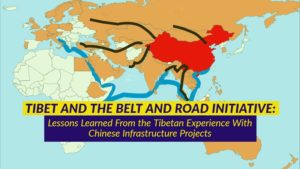 On the surface, the ongoing trade dispute between the United States and China is all about economics and business. But a more consequential struggle over ideology and global security pits the world’s leading free economy against the leading example of state-directed capitalism; the world’s leading liberal democracy against its last major communist-ruled state, The South China Morning Post’s Cary Huang reports:
On the surface, the ongoing trade dispute between the United States and China is all about economics and business. But a more consequential struggle over ideology and global security pits the world’s leading free economy against the leading example of state-directed capitalism; the world’s leading liberal democracy against its last major communist-ruled state, The South China Morning Post’s Cary Huang reports:
China’s recent developments have convinced policymakers in Washington that they are witnessing the revival of a new Soviet empire in the cold-war era, which should be contained before it is too late. Joseph Nye, the Harvard Kennedy School political scientist who coined the term “soft power”, has begun to describe Chinese global influence as “sharp power”, and says “we must resist it”.
Oppressive governments are buying Chinese technology that allows them to track and monitor their citizens, according to a senior State Department official, AP reports:
China pioneered this technology in regions such as Tibet and Xinjiang to spy on Tibetans, Uighurs, ethnic Kazakhs and members of other minority groups. The deals exporting this high-tech surveillance and tracking equipment are often part of China’s Belt and Road Initiative, according to a recent report, “Grading China’s Belt and Road,” from the Center for a New American Security.
 “China exports technological know-how that can help authoritarian governments track, reward, and punish citizens through a system of digital surveillance,” Kimberly Breier, assistant secretary of state for Western Hemisphere affairs, said in an April 26 speech at the Council of the Americas.
“China exports technological know-how that can help authoritarian governments track, reward, and punish citizens through a system of digital surveillance,” Kimberly Breier, assistant secretary of state for Western Hemisphere affairs, said in an April 26 speech at the Council of the Americas.
The “‘China model’ of economic development and Internet control is becoming more appealing to authoritarian-leaning leaders around the world,” Adrian Shahbaz, research director for technology and democracy at Freedom House, said in a February survey on the links between technology and authoritarianism.
Latin America is compromised in their dealings with China due to their incomplete understanding of the Chinese Communist Party, the Council of the Americas forum heard.
Christopher Walker, VP for Studies and Analysis, National Endowment for Democracy, said the task now is to weigh the costs and benefits to decide whether the relationship is balanced and beneficial to them.
“To the extent that they are under-informed or don’t have an authentic understanding of [China’s foreign relations strategies], it puts them at a terrific disadvantage,” he said
 Dolkar, a 26-year-old exile Tibetan, lives in Delhi. Eighteen years ago, she escaped from Tibet with her father, making a perilous trek across the Himalayas that ended in tragedy. Dolkar has suppressed all recollection of that traumatic incident. But when she unexpectedly encounters Gompo, the guide who abandoned them during their journey, memories of her escape reignite and she is propelled on an obsessive search for retribution and closure. Flashbacks of her desperate journey with a small group through a harsh and desolate Himalayan terrain punctuate her growing predicament in the present as she follows Gompo through the alleys of the Tibetan refugee colony in Delhi. The two stories move in tandem until Dolkar and Gompo finally confront each other.
Dolkar, a 26-year-old exile Tibetan, lives in Delhi. Eighteen years ago, she escaped from Tibet with her father, making a perilous trek across the Himalayas that ended in tragedy. Dolkar has suppressed all recollection of that traumatic incident. But when she unexpectedly encounters Gompo, the guide who abandoned them during their journey, memories of her escape reignite and she is propelled on an obsessive search for retribution and closure. Flashbacks of her desperate journey with a small group through a harsh and desolate Himalayan terrain punctuate her growing predicament in the present as she follows Gompo through the alleys of the Tibetan refugee colony in Delhi. The two stories move in tandem until Dolkar and Gompo finally confront each other.
Ritu Sarin and Tenzing Sonam are an Indian-Tibetan couple whose previous films include The Sun Behind the Clouds and Dreaming Lhasa. The Sweet Requiem will be presented in Tibetan and Hindi with English subtitles. Following the screening, panelists will discuss the making of the film and the situation of Tibetan refugees in India.
Opening Remarks
- Rep. James P. McGovern, Co-Chair, TLHRC
 Panelists
Panelists
- Ritu Sarin, Filmmaker, The Sweet Requiem
- Tenzing Sonam, Filmmaker, The Sweet Requiem
Moderator
- Tencho Gyatso, Director of Outreach, International Campaign for Tibet
Please join the Tom Lantos Human Rights Commission for a screening of the 2018 film The Sweet Requiem (Kyoyang Ngarmo), followed by a panel discussion with filmmakers Ritu Sarin and Tenzing Sonam.
Thursday, May 9, 2019
5:00 – 8:00 PM
2200 Rayburn House Office Building, Capitol Hill, Washington, DC.
This briefing will be open to Members of Congress, congressional staff, the interested public, and the media. For any questions, please contact Rosie Berman at 202-225-3599 or Rosie.Berman@mail.house.gov (for Co-Chair McGovern) or Piero Tozzi at 202-225-3765 or Piero.Tozzi@mail.house.gov (for Co-Chair Smith).







